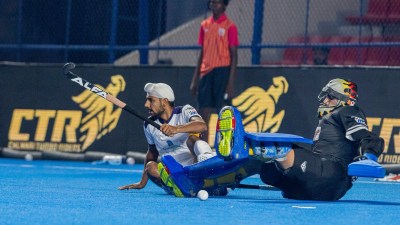Passing through/Dr L Subramaniam
Unassuming is the best word that comes to mind while sitting in front of violin maestro Dr L Subramaniam. For all his accolades, he has n...

Unassuming is the best word that comes to mind while sitting in front of violin maestro Dr L Subramaniam. For all his accolades, he has none of the hang-ups that accompany fame and fortune, as he launches into the story of his life, which is sprinkled with names such as Yehudi Menhin and Stephen Grapelli, all of whom he has performed with.
Inspired by his father to learn classical vocal music at the age of two, he switched over to violin when a severe attack of diptheria could have robbed him of his vocal chords. quot;What was clear was that all the children in the family had to imbibe some form of classical music,quot; he says. Being an open-minded person, his father actively encouraged his interest in Western classical music 8211; quot;I did not know who it was then, but when I was about eight, I first heard Bach, and liked it very much,quot; says Subramaniam.
His first performance at the age of six at Jaffna College, Sri Lanka, where they lived, was the biggest surprise to him. quot;My father just announced in the middle of the show that I would be performing, since the authorities had flatly refused to allow such a small child to do so,quot; he reminisces.
The baby steps only made bigger strides as he got older. At the age of 10, when his family fled from the Sri Lankan riots to Madras, he was encouraged to pursue both his muse and academics. quot;At my father8217;s insistence, I did my medical degree, after which I wanted to do a degree in music. But the Madras University was not very kind 8211; they said that I would have to go to Annamalai first, and what not. So I went to the United States instead,quot; he says.
No novice in Western Classical music, here began the journey of the person who personifies fusion violin today. quot;Recognition of Indian music as classical was a long and tough process. In the 8217;60s and 8217;70s, people thought of Indian music as Third World music, and labelled it folk8217;, at best. Today, they acknowledge that we are an older tradition, and the label of classical fits,quot; he says.
On his role in bringing the violin to the fore as a classical Indian and fusion instrument, Subramaniam states that it was his father who was responsible. quot;My father always told me that the violin is an accompanying instrument, which is not new to the West. To bring it to the forefront, that too orchestrating Indian classical music, I would have to work twice as hard, which proved true,quot; he says.
The twists and turns of pursuing his passion took him to all kinds of places, working with all kinds of people. He composed for Mira Nair8217;s Mississipi Masala and Salaam Bombay 8211; quot;mostly at my wife, Viji8217;s insistencequot; 8211; composed for Zubin Mehta, and performed with Herbie Hancock.
Today, he feels that the scenario has improved greatly. quot;Exponents of classical music of both kinds, Hindustani and Carnatic, are appreciated and recognised everywhere they go. The globalisation of music is greater now,quot; he says. And about time too. For Subramaniam believes that boundaries are set by people, not the medium; which is, after all, based on seven notes worldwide. quot;What is fusion,quot; he wants to know, quot;but a return to origins of music as it were?quot;
What indeed?
Dr L Subramaniam was in Mumbai to perform at a show organised by Enron today
- 01
- 02
- 03
- 04
- 05































